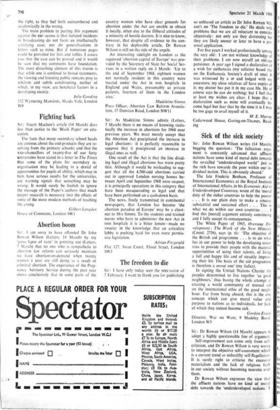Sick of the sick society
Sir: John Rowan Wilson writes (14 March), begging the question: 'The fallacious argu- ment is constantly advanced that affluent nations have some kind of moral debt towards the so-called "underdeveloped world" just as the rich have towards the poor within our in- dividual nation. This is obviously absurd.'
The late Frederic Benham, Professor of International Economics at the Royal Institute of International Affairs, in his Economic Aid to Underdeveloped Countries, wrote of the 'moral duty of the richer countries to help the poorer . . . It is our plain duty to make a sincere, substantial and sustained effort . . . This is what we do within our own countries . . . I find this [moral] argument entirely convincing and I fully accept its consequences.
The White Paper of 1965, Overseas De- velopment : The Work of the New Ministry (Cmnd. 2736), says (p. 6): The objective of the British aid programme . . . is to do what lies in our power to help the developing coun- tries to provide their people with the material opportunities of using their talents, of living a full and happy life and of steadily improv- ing their lot. The basis of the aid programme is therefore a moral one' (my italics).
In signing the United Nations Charter the peoples determined to live together 'as good neighbours,' thus basing the whole attempt at creating a world community of mutual aid on the international ethic of the good neigh- bour. Far from being absurd, this is the one concept which can give moral value and purpose to nations as to individuals, for lack of which they indeed become sick.
Gordon Evans Director, War on Want, 9 Madeley Road, London W5










































 Previous page
Previous page